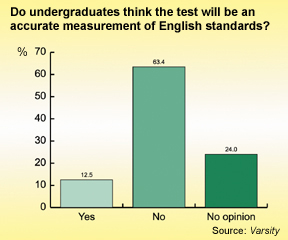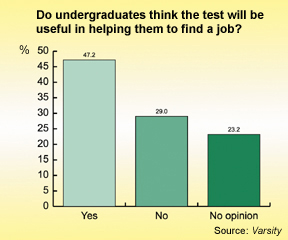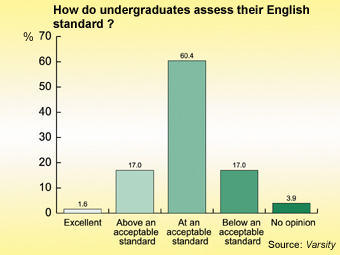Although the English proficiency exit test aims
at raising the English standard of university students, it does not have much
student support.
According to a survey done by Varsity in Novermber 2001, almost 80 percent
of University students think that their English is at or above an acceptable
level. Only 17 percent think that their English is below an acceptable standard.
Simon Tse Kay Chun, external vice-president of Hong Kong University of Science
and Technology Student Union, opposes the implementation of an English exit
test.
“I do not agree that the English standard of university students is declining.
They passed the Advanced Level Examination in English.
“Students receive two years of English training in high school, where
they learn to write reports, formal letters and memos. That should be enough
for their future needs in society.
“They are able to communicate in English. That is the most important
thing.”
Mr. Tse said that if the test focuses on grammar or English comprehension,
it would be similar to the Advanced Level Examination.
“It would be a waste of resources.
“Resources could be used in a more effective way like hiring more professors,
providing more English courses, lowering the teacher-student ratio and providing
more English learning centers,” he said.
“Just to implement a test without follow-up work is certainly not the
best way to raise the standard of English of university students.”
The survey also shows that university students doubt the effectiveness of
such a test to achieve its goals.
About 57 percent say the test would not raise the standard of English, and
63 percent say the test would not be an accurate measurement their command
of English.
Sunshine Yeung Man Kwong, academic affairs executive of The Chinese University
Student Union, agrees.
“If the University Grants Committee really wants to raise students’
language standards, they should offer more courses or facilities instead of
setting up a test.
“I think the test would only help employers to choose employees.
“Moreover, training in language skills is the responsibility of primary
and secondary schools, not universities.
“It is too late to start training them in basic English language skills.
“It would be better to have changes in education at the primary school
level rather than during tertiary education,” he said.
Mr. Yeung is also concerned about the freedom of learning among university
students.
He said universities are places for students to learn and exchange ideas freely.
All students should have the freedom to choose what they want to learn.
“The centralized English proficiency exit test will deprive students
of their freedom. It is an insult to the independence of tertiary education,”
he said.
“Moreover, students may actually be forced to take the test.
“Although the University Grants Committee said that the test may be optional
to students, students who have taken the test will have advantages in job
seeking,” said he.
According to the Varsity survey, about 48 percent of university students think
that the test would be useful in helping them find a job. Only 29 percent
of them do not think so.
Lo Yu Yan, a Year 2 chemistry student at the Hong Kong University of Science
and Technology, said she was afraid employers would regard the test as the
only yardstick of student achievement.
“If employers take the test results seriously, this will put tremendous
pressure on students.
“It is also unfair to students who do not major in English,” said
she.
Both Mr. Tse and Mr. Yeung from Hong Kong University of Science and Technology
Students Union and The Chinese University Student Union said that the University
Grants Committee should cancel the English proficiency exit test.
“I know that calling for cancellation of the test may be too idealistic.
But it is certainly the best solution,” Mr. Tse said.
“We will fight against the test until a reasonable solution is reached.”


About 63 percent of respondents think that the test would not measure the English standard of university students accurately.

About 47 percent of respondents think that the test would be helpful to them in finding jobs.

About 60 percent of respondents think they are at an acceptable standard of English proficiency, despite outside criticism.
Methodology of Varsity's survey
Varsity's survey was based on a random sample
of university students in Hong Kong. It aimed at measuring their opinions
of the implementation of the English proficiency exit test.
From 5 to 9 November 2001, 490 questionnaires were distributed to students
on campuses at eight universities in Hong Kong:
- City University of Hong Kong
- Hong Kong Baptist Univeristy
- The Chinese University of Hong Kong
- Hong Kong Polytechnic University
- The Hong Kong Institute of Education
- The Hong Kong University of Science and Technology
- The University of Hong Kong
The sampling error is 4.5 percent, based on a 95 percent confidence level.